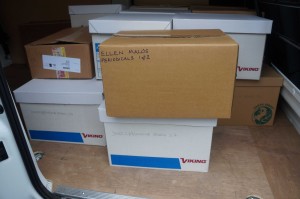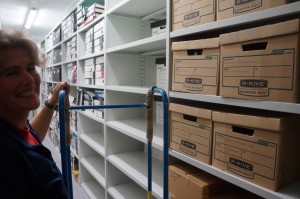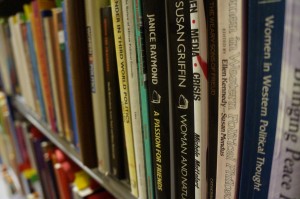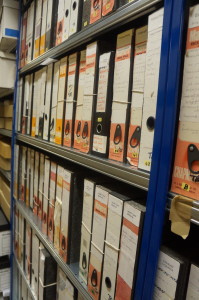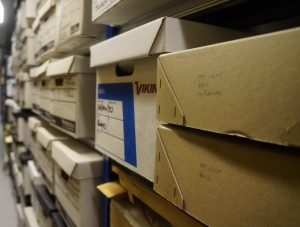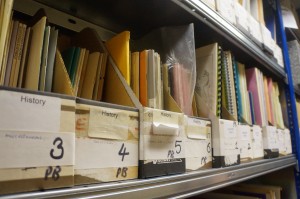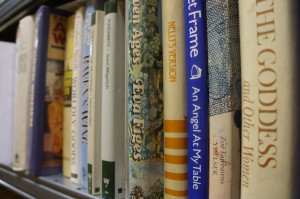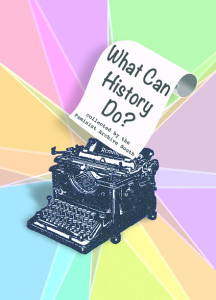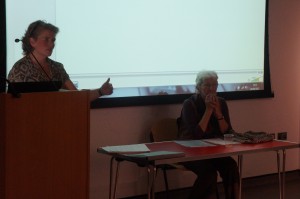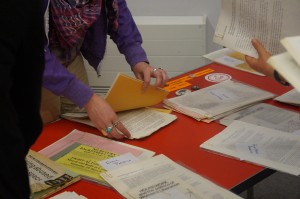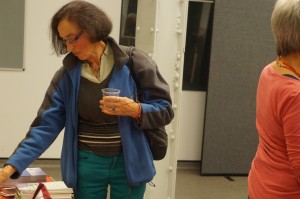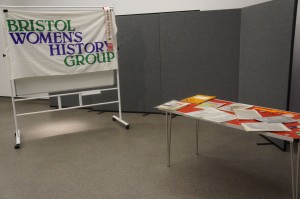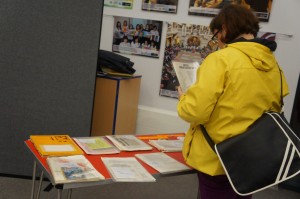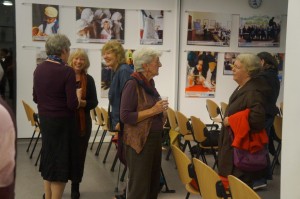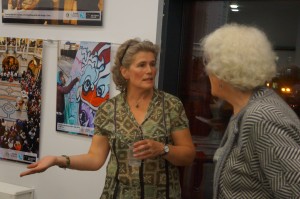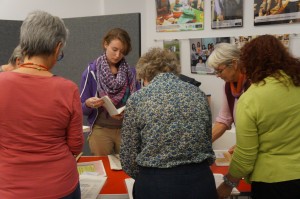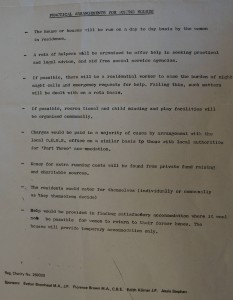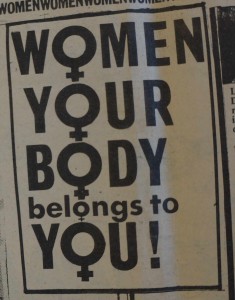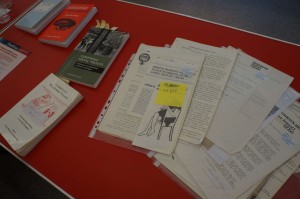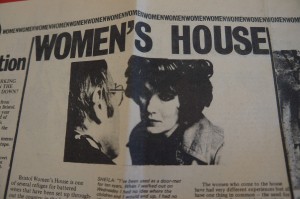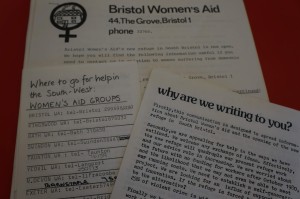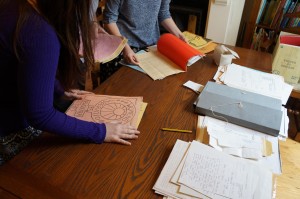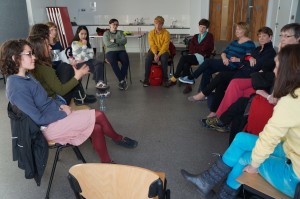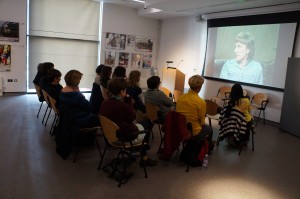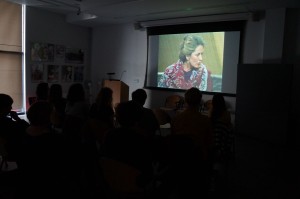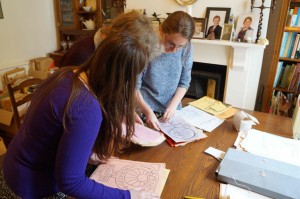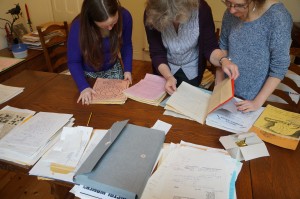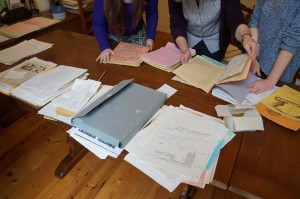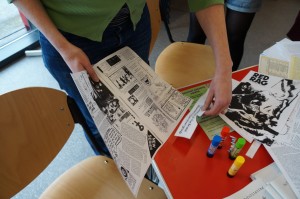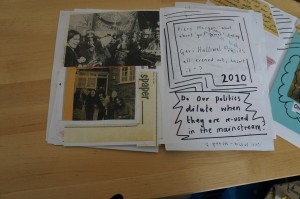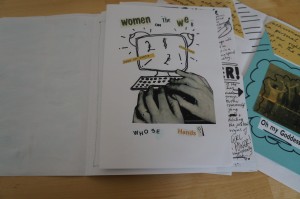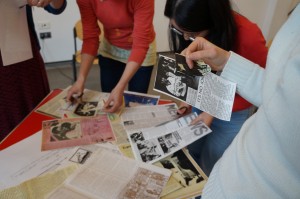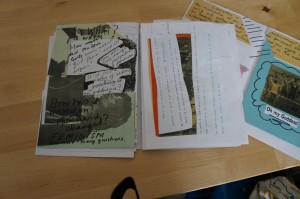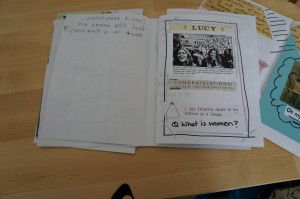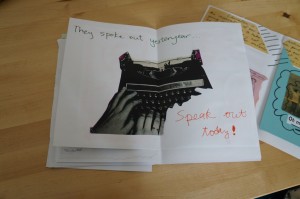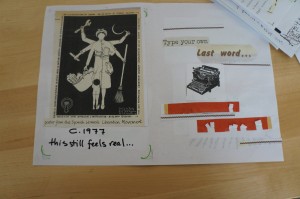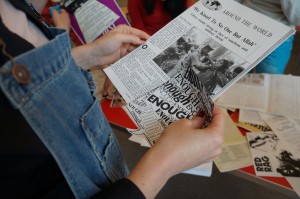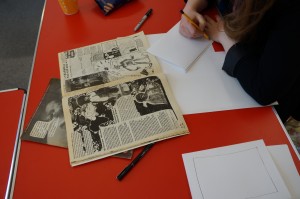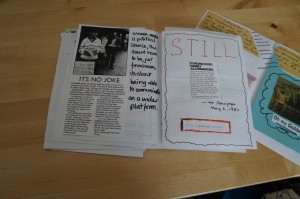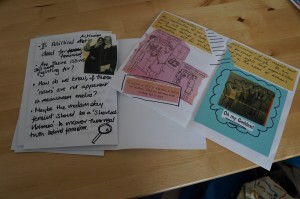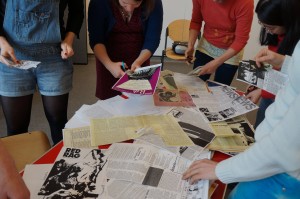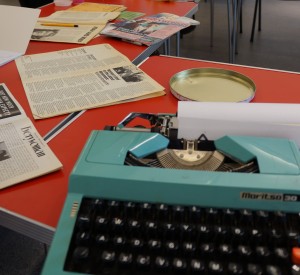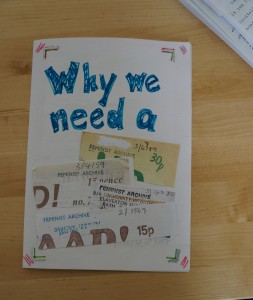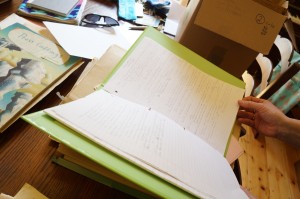The post Sistershow materials catalogued and searchable appeared first on Feminist Archive South.
]]>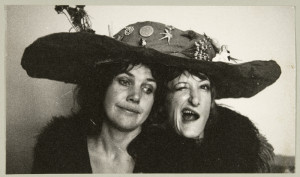
Pat VT West & Jackie Thrupp sit together under a giant hat that was made by Jackie for the first Sistershow performance in March 1973
In the meantime, enjoy these photos that we digitised as part of the project:
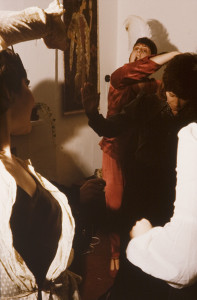
The figure dressed in red satin is Alison Rook, who donated a large archive for the exhibition, and was instrumental in getting the project off the ground.
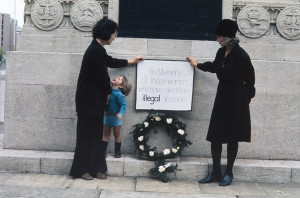
Part of Helen Taylor and Brenda Jacques tape slide project that was used to raise awareness between women/ feminist groups about the activities and ideas behind women’s liberation
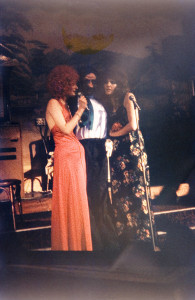
One of the few photographic documents of the Sistershow performances. This is the first show, that took place at Bower Ashton. Note the degradation of the image.
We still have catalogues from the exhibition available and you can get one for a small donation.
The post Sistershow materials catalogued and searchable appeared first on Feminist Archive South.
]]>The post Final Stop for Ellen’s Archives appeared first on Feminist Archive South.
]]>Sarah stands in front of her handy work
Don’t forget, Ellen’s archives are available to consult so do get in touch if you want to see them. As always, you will need to plan your trip in advance to ensure the items you want can be retrieved from store.
The post Final Stop for Ellen’s Archives appeared first on Feminist Archive South.
]]>The post Final event for Ellen Malos’ Archives – documentation appeared first on Feminist Archive South.
]]>We welcomed Cherry Ann Knott from the Heritage Lottery Fund, project archivist Sarah Cuthill presented the contents of Ellen’s archive, and Ellen provided a response.
The evening also launched our booklet What Can History Do? which is available for a donation through this website.
After the formal presentations, attendees had the opportunity to browse material from Ellen’s archive, as well as have good chat.
Thanks to everyone who came and participated in the wider project. We are working on some new ideas for funding bids, but will of course keep this blog updated with regular information about relevant events in Bristol and beyond.
Ellen’s archive is catalogued and available to view in the Feminist Archive South, so don’t forget you can pay us a visit if you are curious about its contents.
In the meantime, enjoy the photos!
The post Final event for Ellen Malos’ Archives – documentation appeared first on Feminist Archive South.
]]>The post Reflections on the History of Bristol Women’s Aid workshop – 20 July 2013 appeared first on Feminist Archive South.
]]>We’ve held a range of workshops and events over the past few months, including the history of feminist print media, film showings, archiving contemporary feminist activism, and singing with Frankie Armstrong.
For the last workshop we explored the history of Bristol Women’s Aid with Ellen Malos and Jackie Barron, unfortunately Nicola Harwin was unwell so she couldn’t join us – get better soon Nicola.
Here is some personal impressions of the workshop written by me (that’s debi, by way…)
The early history of women’s aid in Bristol has been fairly well recounted on this blog – a single bed that happened to be in the Women Centre in 1973 was the seed from which Women’s Aid in Bristol grew. The centre often received calls from the police and the Samaritans to see if they could help women and children who were experiencing domestic violence, and it soon became clear that there was a real need for services to help vulnerable women in Bristol. Women and their children would take refuge in the centre for a few nights, but as the centre was a busy place they could not stay there all the time. In 1973 there was literally no support, and no understanding of the abuse women suffered, and it was commonly stated by authorities that women should just ‘go home’ to their violent partners.
As the calls to the women’s centre became more frequent, WLM activists began searching for a property where women could live safely. This became known as the ‘Women’s House Project.’ Recounting the early histories of women’s aid demonstrated how ‘women’s safe houses’ acted as spaces of mutual aid and co-operation, embodying many of the political ideals of the women’s movement as the first point on the document illustrates: ‘the house will be run on a day to day basis by the women in residence.’
The workshop revealed how WLM activists invented language to describe and analyse violence against women, including the very term we use today – ‘violence against women.’ Some of this language, such as ‘battered women’ now seems out-dated, and we reflected in the workshop on how terminology has changed as more became known about the field.
It might be worthwhile here to just pause a minute and consider: can you imagine living in a culture where there was no language to describe certain kinds of violence? As one contributor, who had been very involved in the development of women’s services in Bath commented, the analyses emerging from the WLM ‘prised open the private domain’ as an arena where women and children can experience physical and emotional violence.
A major part of the development of women’s aid and related services was research and policy reform. As Ellen was keen to state, women in the movement had no previous knowledge of law or social policy so they had to pick things up as they went along. This meant learning how the complex machinery of the state worked, negotiating dense bureaucracy and exercising immense powers of diplomacy. As Ellen jokingly reflected, she developed the skill to sit in meetings with sexist men, resist the urge to strangle them and maintain working relationships that helped them make incremental gains in attaining vital services for women.
I asked Ellen if she felt there was any tension between working so directly to reform patriarchal law and the aims of the wider movement that attempted to revolutionise the whole of society. As a socialist, Ellen personally felt there was no contradiction in pursuing such a course of action, but she did suggest there were people in the movement who were critical of these strategies. Ellen emphasised however that the women’s aid movement did not operate solely to change the law. It also aimed to change cultural perceptions and behaviour so that we can live in a world where violence against women is understood to be completely unacceptable. This is clearly an area where activism is vibrant in contemporary feminism, but there is still a very very long way to go before this aim is realised.
A revealing conversation from the afternoon focused on how the austerity measures implemented by the coalition government risk creating a situation where women’s financial independence will be curtailed, which could potentially mean women stay in relationships with violent partners. The introduction of a single payment of Universal Credit in October 2013 decrees that benefit payments can only be paid to one person per household, and does not stipulate the gender of the person money should be paid to.
Feminists have long emphasised the importance of women’s financial independence through benefit payments. Eleanor Rathbone argued for a system of family allowances paid directly to mothers as early as 1918. When threats to family allowance were tabled in the 1970s, women in the WLM mobilized to ensure that payments were still paid to the mother. The change to how benefit payments are structured in the UK may mean that payments go the man, therefore eroding what for some women is crucial access to financial autonomy.
Such changes in welfare policies demonstrate that the struggle for equality and cultural transformation at the heart of feminist politics is a continuous one. Advances can be made but they can also be retracted, particularly in an age of austerity where women’s freedoms are surplus to financial requirements. The workshop also demonstrated to me that understanding these struggles in a wider historical context is crucial, so that we can better understand how feminist incisions can be made in political and cultural life.
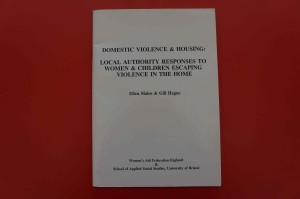
This was one of the first pieces of research to explore how local authorities were implementing laws to protect women escaping violence in the home
I hope that the plans to write the history of Bristol Women’s Aid is realised quickly. Contemporary activists would benefit from knowing how to make policy interventions and transform the law. It is clear that the current government is unpicking just about every progressive piece of legislation made in the 20th century. Sharing such knowledge and skills across feminist generations is vital for understanding the varied strategies of committed resistance women have collectively practiced throughout history. As I said earlier, the fight for equality and cultural transformation is a continuous one, and recording and sharing what we have done is an integral part of sustaining political action.
The post Reflections on the History of Bristol Women’s Aid workshop – 20 July 2013 appeared first on Feminist Archive South.
]]>The post Archiving Update – May/ June appeared first on Feminist Archive South.
]]>The archive is taking shape. Following the survey at Ellen’s, I had to weed duplicates and non-relevant material from the boxes. This takes up a lot of table and floor space! The archive shadowers came to four sessions in May and June and contributed to the next stage of the work, arranging the material into categories. With a personal archive such as this, some of the arrangement is straightforward; some can be a little less obvious.
The ‘shadows’ worked on Women’s Aid, NAFE, Women’s Liberation Movement, and History papers. For them the breadth of material seemed to be striking, and for me the opportunity to discuss the papers and to make collective decisions was definitely useful. We began to transfer the archive into more appropriate housing, using acid-free four-flap folders and records management boxes.
On June 27th there was a chance to talk briefly about the work in progress at one of the Feminist Archive South workshops. By the end of June the arranging was nearly done, and I was using my initial lists to describe the individual folders. The need for detail varies from collection to collection, but this can be revised in the next stage of the job, which will be inputting on the CALM system at Special Collections.
The post Archiving Update – May/ June appeared first on Feminist Archive South.
]]>The post Next event: archiving contemporary feminist activism appeared first on Feminist Archive South.
]]>Feminists and women’s rights activists have often made a strong connection between history and social change. Simply put, when women are written out of the history books, their culture, achievements and lives are seen as less important than men’s. Such a perspective was a motivating force in the creation of the Feminist Archive, and the Women’s (formerly Fawcett) Library in London.
Such facts beg the question: how do we archive the present? How do we ensure that online 21st century feminist activism is documented in a secure way? How do we collect records of a movement as it is happening now, what do we remember, and what do we forget?
As part of the evening we will create a timeline of 21st century Bristol feminist activism, hear from experienced archivists and conduct live oral histories.
If you have participated in feminist activism in Bristol in the 21st century and have fliers or ephemera that you would like to deposit in the Feminist Archive South, please bring it along.
Join us for this important conversation! If you want to be part of history, you gotta make it!!
All welcome, please share!
The post Next event: archiving contemporary feminist activism appeared first on Feminist Archive South.
]]>The post Photos from recent workshops appeared first on Feminist Archive South.
]]>The post Photos from recent workshops appeared first on Feminist Archive South.
]]>The post Letter from Jane Hargreaves, former FAS Trustee appeared first on Feminist Archive South.
]]>Hi Debi,
You said that I had obviously felt very strongly about the Women’s Caravan of Peace which Dora Russell took to the communist bloc countries of East Europe at the height of the cold war in 1958. Yes I do feel awed – principally because they went at a time when women had very little autonomy. I had that same feeling of admiration when I came across a small archive of a young PE teacher called Barbara Dodds who went out to the then colonial Kenya in the 50′s to be in charge of physical education for girls country-wide. Barbara immediately interpreted this to mean for all girls regardless of ethnic group or social disadvantage. She later travelled worldwide as an activist for women’s peace groups. Both of these archives are really outside the remit of the FAS in that the origin of ‘second wave ‘ feminism is reckoned to be in the late 60′s and reform did not become revolution until the 70′s. But they chime with me.
I arrived at the FAS in the 90′s having retired from teaching. I had been deeply involved in creating a policy of equal opportunities at the school where I had taught. I had helped to institute and been part of a team delivering the highly successful Professional Development for Women Teachers course. I thought I knew what feminism was. Now I found this amazing mound of dusty papers and books and periodicals piled up in the corner of the FA room presenting whole new aspects of feminist history.
So I fell upon the books and discovered Mary Daly and Gyn/Ecology. I revelled in her use of language and her excoriation of ‘Godfather’ theology. And then I came across Fran Hosken and was shocked by her exposure of female genital mutilation and angered that in the 30 years since she wrote it so little has been done to eradicate this. On the lighter side I had a choice of the complete set of novels from Virago, the first all-woman publishing house. I laughed at Cath Tait cartoons. I revelled in the art work in the two boxes of book jackets from the earliest days of the Women’s Press. I found lovely prints by Monica Sjoo and drawers full of posters ranging from women’s theatre to political campaigns. There were striking prints by Pen Dalton. I am not likely to forget ‘Women are Revolting’ or ‘Free Castration on Demand’. We spent happy hours photographing posters and badges and putting them on our old website which was up and running as early as 1997.
There were friendships to be made. Just when I thought that nobody would ever look at the Dora Russell archive up popped a German-Portuguese researcher. Then Margaretta Jolly researched women’s letters and gave us a new computer! And when I had finally sorted out most of our Greenham Peace Camp holdings, Holger Terp, a near-blind researcher from Denmark, began a quest for songs from Greenham and for a heady time we were crisscrossing sources until his site had as complete a collection as he could make it. Archif Menywod Cymru/Women’s Archive of Wales showed welcome sisterhood. IIAV (the Dutch international women’s archive) in Amsterdam were practical and generous. I had a mindboggling time getting to grips with their international Women’s Thesaurus and this led to me reorganising the classification system in the FAS for the second time. That is the prosaic reason that all the labels are scrawled over and rewritten two or three times. Not neat but I hope effective!
The reclassification led me to look at the various papers scattered around under the loose heading of ‘abortion’. We managed to trace a history of abortion law reform in these papers from the 1967 Act to the discussions about embryo research in the 90′s. Together with articles in periodicals and pamphlets these are records of the steadfast campaigning of abortion law activists both locally and nationally. For me they were a reminder of the repressive atmosphere and hypocrisy of the 50′s.
Most women know of the legendary Spare Rib magazine. There is a complete set in FAS. But there is also a huge (unpublished) box of letters to the editor; not for general readership, but perhaps the time is right for restricted research. What else? There is a music collection on vinyl and an audio collection on tapes which may be disintegrating before examination. The collecting phase at FAS will largely be over when the pivotal Ellen Malos archive has been accessed. Now it all needs to be understood and interpreted by a different generation.
The post Letter from Jane Hargreaves, former FAS Trustee appeared first on Feminist Archive South.
]]>The post Action Photos from the Feminist Print Media Workshop! appeared first on Feminist Archive South.
]]>After a brief tour of magazines such as Spare Rib, Shocking Pink, Red Rag and Bad Attitude, newspapers such as Outwrite and Shrew, Enough: The Journal of Bristol Women’s Liberation and Fowaad! the newsletter for the Organisation of Women of Asian and African Descent, we leapt into action and made our own publication.
A trip to a local stationery store is planned to reproduce it, and copies will be available at future workshops!
The post Action Photos from the Feminist Print Media Workshop! appeared first on Feminist Archive South.
]]>The post Archivist cataloguing update – April/ May appeared first on Feminist Archive South.
]]>The first month, about half of which was spent at Ellen’s house, where the papers were in much better order than anticipated! Originally covering the floor and tables of the first floor lounge, the archive comprises journals, business files, research papers, conference papers, badges, correspondence and ephemera such as fliers and posters for relevant events. Most of the papers were in folders or in homemade magazine files made by Ellen out of washing powder boxes. Eventually I boxed the collection up into cardboard grocery boxes from our local organic shop.
Ellen quietly added extra piles of papers over the days. It was a boon, and a novelty, to have the owner of the papers there with me to explain how various organisations grew out of each other and where she was involved. As well as Ellen’s own research, there are important runs of papers relating to Women’s Aid and the Women’s Centre. We spent one morning with Ellen giving me a potted history of her life since coming to Bristol. My primary mission in these first weeks has been to survey the papers and make a quick list of what is there I did this with pencil and paper which I then typed up at home.
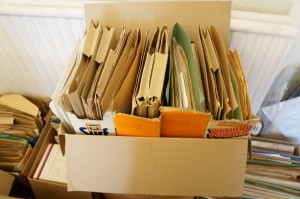
Two and half weeks in, we transferred the papers to my house in 18 cardboard boxes. The next step is to arrange the papers into logical categories, and to rebox them. This is to be done with the help of archive shadowers who will join in and learn about the archive as well as the archive process.
The post Archivist cataloguing update – April/ May appeared first on Feminist Archive South.
]]>